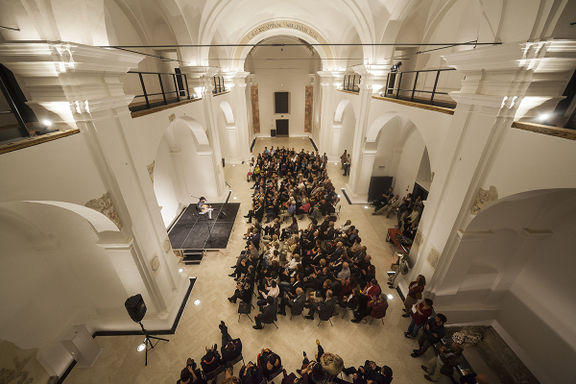Difference between revisions of "Festival Maribor"
(produced by ...) |
(popravki Programme via email) |
||
| Line 39: | Line 39: | ||
{{Teaser| | {{Teaser| | ||
| − | In the course of its rich history the [[Maribor Festival]] has become one of Slovenia's most exquisite classical music events. Held each year in September it comprises around 20 concerts by over 200 musicians in | + | In the course of its rich history the [[Maribor Festival]] has become one of Slovenia's most exquisite classical music events. Held each year in September it comprises around 20 concerts by over 200 musicians in Maribor and its partner cities (Ptuj, Dornava, Prevalje and Velenje). The main and accompanying programme are dedicated mainly to chamber music, but lately enriched also with symphonic works and different crossover genres. It is led by Richard Tognetti, violin player, conductor, composer, and artistic head of the Australian Chamber Orchestra. The series of concerts includes also morning matinees. |
}} | }} | ||
==Background== | ==Background== | ||
| − | The roots of the Maribor Festival date back to [[established::1963]] when a festival of baroque music was organised by the Concert Management Maribor. In 1994 the festival was held with its concept and name changed to ''Glasbeni September'' ("Musical September"), an International Chamber Music Festival, under the artistic directorship of the pianist and professor [[Janko Šetinc]]. It has taken place every year in Maribor for the past 10 years. | + | The roots of the Maribor Festival date back to [[established::1963]] when a festival of baroque music was organised by the Concert Management Maribor. In 1994 the festival was held with its concept and name changed to ''Glasbeni September'' ("Musical September"), an International Chamber Music Festival, under the artistic directorship of the pianist and professor [[Janko Šetinc]]. It has taken place every year in Maribor for the past 10 years. Up to 2007 the festival programme was created by well-known chamber musician, Croatian horn player Radovan Vlatković. |
| − | + | The festival is also distinguished for its unique approach to organisation as the invitations to participate in the festival were not given to chamber ensembles with their concert repertoire being pre-defined but rather, in the majority of cases, to top musicians – soloists – who then created ensembles in Maribor according to the programme selected by the artistic director. Since 2008 the festival has been run under the new name Maribor Festival and since 2010 it has been produced by the [[Slovene Philharmonic String Chamber Orchestra]]. | |
==Programme== | ==Programme== | ||
| − | In the first years the festival was dedicated mainly to baroque music, but later it offered a distinguished range of chamber music from the Baroque to present times. In the last years | + | In the first years the festival was dedicated mainly to baroque music, but later it offered a distinguished range of chamber music from the Baroque to present times. In the last years the chamber music from various periods has been joined by symphonic music, a special evening dedicated to multimedia projects (combinations of music and photography or video) and different crossover genres (jazz and ethno music). |
| + | |||
| + | Acclaimed musicians from all over the world have been part of this innovative festival: Boris Berezovski, Vlatko Stefanovski, Joseph Tawadros, Knut Erik Sundquist, Giovanni Sollima, William Burton, Katie Noonan, Luka Šulić, Danny Spooner, [[Marko Letonja]], [[Vasko Atanasovski]] and many other eminent instrumental and vocal soloists and choirs. | ||
| + | |||
| + | The Maribor Festival enjoys international acclamation also by many critics, among them John Allison from the ''London Telegraph'' that rated the festival with four stars and described it as "one of the best European summer festivals". | ||
| + | |||
==Venues== | ==Venues== | ||
Revision as of 20:30, 20 July 2011
Background
The roots of the Maribor Festival date back to 1963 when a festival of baroque music was organised by the Concert Management Maribor. In 1994 the festival was held with its concept and name changed to Glasbeni September ("Musical September"), an International Chamber Music Festival, under the artistic directorship of the pianist and professor Janko Šetinc. It has taken place every year in Maribor for the past 10 years. Up to 2007 the festival programme was created by well-known chamber musician, Croatian horn player Radovan Vlatković.
The festival is also distinguished for its unique approach to organisation as the invitations to participate in the festival were not given to chamber ensembles with their concert repertoire being pre-defined but rather, in the majority of cases, to top musicians – soloists – who then created ensembles in Maribor according to the programme selected by the artistic director. Since 2008 the festival has been run under the new name Maribor Festival and since 2010 it has been produced by the Slovene Philharmonic String Chamber Orchestra.
Programme
In the first years the festival was dedicated mainly to baroque music, but later it offered a distinguished range of chamber music from the Baroque to present times. In the last years the chamber music from various periods has been joined by symphonic music, a special evening dedicated to multimedia projects (combinations of music and photography or video) and different crossover genres (jazz and ethno music).
Acclaimed musicians from all over the world have been part of this innovative festival: Boris Berezovski, Vlatko Stefanovski, Joseph Tawadros, Knut Erik Sundquist, Giovanni Sollima, William Burton, Katie Noonan, Luka Šulić, Danny Spooner, Marko Letonja, Vasko Atanasovski and many other eminent instrumental and vocal soloists and choirs.
The Maribor Festival enjoys international acclamation also by many critics, among them John Allison from the London Telegraph that rated the festival with four stars and described it as "one of the best European summer festivals".
Venues
The Maribor Festival venues are the Union Hall, Rotovž Square, Knights Hall at Maribor Castle, Maribor Cathedral, Casina Hall and the Old Hall at the Slovene National Theatre Maribor, the Knights Hall at Ptuj Castle, and the Narodni dom Hall in Maribor. But concerts take place at concert halls and in churches and castles, not only in Maribor but also in some picturesque nearby cities (Ptuj, Slovenj Gradec).




